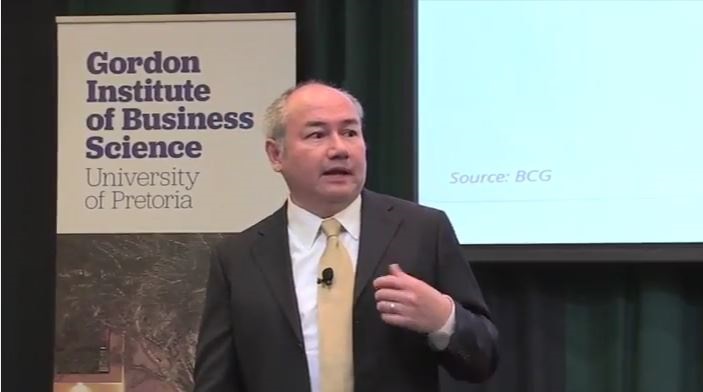
Disruptive digital technology has fundamentally changed the way millions of people travel in cities, where they stay on holiday and how they shop. While household names like Uber, Airbnb, Amazon, Spotify and Netflix have barely been around for a decade, their effect on consumers, and established industries, has been felt across the globe.
“The pace and effects of disruption have been tremendous, and it is happening faster than ever before,” chief executive of Academic Partnerships, Carl Sparks, told a recent University of Pretoria’s Gordon Institute Business Science (GIBS) forum gathering.
While disruptive technologies aren’t new, their scope, breadth and potential application for transforming new areas of our lives is ever increasing.
Sparks, who was previously president and chief executive of Travelocity and chief marketing officer of Expedia, which brought the travel industry into the online era, explained that disruption itself has fundamentally changed.
Lower capital investment requirements and improved software development mean disruptive technologies can be created for less. Dramatically lower prices have allowed for an acceleration of technology startups with greater distribution and the opening up new markets.
“All of these factors expand access and give choice and control to consumers.”
Sparks said he was optimistic the technology gap in developing countries could be bridged as lower cost and increased access are intrinsically linked to disruption: “The four mega trends of disruption - price, distribution, ideas and globalisation can be forces for good,” he said.
Expanded applications of disruptive technology
Sparks said he was particularly excited about the potential application of disruptive principles to a traditional industry such as higher education, where price and access remain prohibitive.
Academic Partnerships’ model is to partner with public universities and help them make the transition into the digital world, Sparks explained.
While the application of disruptive technologies to higher education is still in its early phases, there is a clear need for a solution to rising debt and cost levels of education; as well as a need for improved distribution as the number of university applicants outstrips the number of available seats. In South Africa, there are three times the number of applicants to available seats at tertiary institutions.
As the market for education expands and lifelong learning becomes the norm, many working people are looking to advance their careers and increase their earning potential through advanced qualifications. “Higher education institutions have to transition to meet this need,” Sparks said. He cited the example of MOOCs, or massive online open courses, offered by reputable higher learning intuitions, as having dramatically opened up new markets, with 75% of students coming from outside the United States.
The labour displacement threat of technology and automation meant “people must focus on constantly refreshing their technical skills,” Sparks said.
“There is an explosive growth of suppliers in the education space, as higher education becomes unbundled,” Sparks said, with content, assessments and credentials provided by different suppliers. This unbundling, combined by digitisation would lead to a proliferation of education services.
Sparks said he envisaged more opportunities for disruption in FinTech, specifically mortgage origination, and in marketing applications for big data: “Machine learning and algorithmic processes allow for more sophisticated application of data, which at present is still very much isolated in silos. Companies are creating disruptive technologies to create intuitive user interfaces that allow for audience management and the ability to seamlessly link channels.”
Organisational response to disruption
The old models of coping, which allowed organisations time to adapt to challenges are now obsolete, Sparks said.
“Traditional management doesn’t see disruption coming. The denial is deep and very real,” he said.
Sparks’ advice for organisations that want to defend themselves from disruption is to consider all potential forces of internal and external disruption. He suggested going so far as to appoint people to the organisation whose sole task it is to think of ways to disrupt or kill products.
“When done right, the internal change should be tremendous,” he added.
Leadership should make the effort to keep organisations flat and informal so that merit trumps seniority: “There is a real relinquishing of power when leadership is not all-knowing and all-controlling,” he said.
Sparks explained that talent is the most important element in the new way of operating, as ideas and their rapid execution are now an organisation’s main competitive advantage.
“Give people autonomy, growth and purpose,” he concluded.
» City Press is a media sponsor of the Gibs forums.




 Publications
Publications
 Partners
Partners








